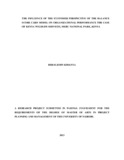| dc.description.abstract | There is an increasing trend towards implementing balanced scorecard (BSC) as a set of performance indicators. The study‘s problem was summarized by that KWS depend on the traditional methods of performance assessment which focuses on the accounting system, and depends on the first place on the financial side of the BSC more, which leads to creating a gap between the organization‘s strategy and the methods of performance measurement. The aim of the study was to establish the influence of the customer perspective of the balance score card model on performance of Kenya Wildlife Service with reference to Meru National Park. The research design that was employed in this study was descriptive survey method. The population of study was 287 respondents comprising of senior managers, middle level managers and support staff at Meru National Park. Based on Krejcie and Morgan‘s (1970) table for determining sample size, for a given population of 287, a sample size of 165 respondents would be appropriate to adequately represent a cross-section of the population at 95% confidence level. Stratified random sampling was used basing the strata on the management levels of employees in Meru National Park. Data in this study was collected using semi structured questionnaires. The data was analysed by use of descriptive statistics (mean score and percentages) and correlation analysis. The study revealed that effective communication system had the highest influence on performance of Kenya Wildlife Service followed by corporate image, then service quality while continuous improvement had the least influence on performance of Kenya Wildlife Services. The study concludes that there is a positive influence between service quality, corporate image, communication, continuous improvement and performance of KWS. The study recommends customer perspective of balanced scorecard training on all cadres of staff. There is a need to balance training to include sufficient technical focus. To maintain a wave of interest in performance, it is necessary to develop generations of managers who not o nly understand but are dedicated to the pursuit of never-ending improvement in meeting external and internal customer needs. | en |

